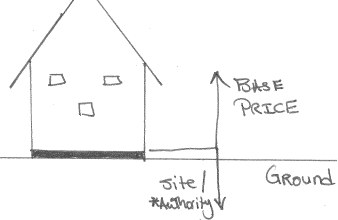Table of Contents
Comparing builders can be very difficult specially when there is no such thing as “standard” inclusions or exclusions. Essentially every builder includes / excludes different items so the onus is on you to try and make sense of it all.
It can prove to be a very daunting if not an agitating task.
A lot of people obtain a couple of builder quotes and then try and compare them as if this is the final price they will be paying. This is simply one of the biggest and most common mistakes that you can possibly make. It’s like going into a dealership and asking what a 4-door car would cost and the consultant telling you it should cost between $20,000 to $25,000. It just does not work.
In this blog we will look at the differences between Quotes vs. Fixed Price Tenders AND when it’s important to obtain a quote vs. a fixed price tender.
Quote
As the name suggests, a quote is just that – it’s a guesstimate of your new home build costs. This is NOT a fixed price, it’s simply an educated guess at best.
For example, if your block has a 2m slope across the building envelope, your home consultant might budget $15,000 for drop edge beam, spoil removal and some additional site costs.
You cannot then compare this vs. another builder who budgets $5,000 for the same extra costs and think that the second builder must be cheaper than the first builder.
This is by far the WORST mistake you can make. It’s like cutting yourself off before you even get started!
Pointers
Unless the front page of your tender specifically states that this is a Fixed Price Tender, it’s a quote.
In a quote, you will usually see the word “Quote” OR “Estimate” or something to that effect. You will find in your tender a lot of:
- Provisional Allowances: provisional allowances almost mean blank cheques for your builder. They are just guesstimates of the specific item and they are allowing for it some money. Nothing more and nothing less.
- Loads of Terms & Conditions: home building tenders usually have a lot of terms and conditions anyway. However a quote will have an unusually higher number of Terms & Conditions.
- Your new home consultant will swear by the stars that this is a fixed price tender: if it is a fixed price tender, then put it in writing. If it is not in writing, it has not happened.
- Loads of Exceptions & Assumptions: there will be notations in the tender stating that no allowance has been for this, or this will be done during our investigations, etc… Just a whole bunch of assumptions and exceptions stated – all designed to reel you in at a lower price.
Different builders frame it differently, but ultimately “all roads lead back to a simple quote”.
Fixed Price Tender
A Fixed Price Tender is a tender with a calculated price that does not change. It takes into account all of your site, authority and any other costs to build your home. Essentially, you do not pay anymore money unless YOU, the client, make changes to your site, design or inclusions.
Please refer to my blog on “How to get a Fixed Price Tender?“.
If there is a provisional allowance included in your tender, it will be stated clearly so you know. There are items (like Onsite Detention Systems) that cannot be fixed, but a lot of items (like piering / drop edge beams / etc…) can be and must be fixed.
Timing
SO when do you obtain a quote? And when is the right time to obtain a fixed price tender?
When you are starting your building journey, it does not hurt to obtain as many quotes as possible. This will help give you an idea about how it all works. However do NOT eliminate any builder based on price, unless price is the most important part of your selection criteria.
I hear a lot of people saying that price is not the most important thing but they still go and pick the cheapest builder based on a quote. You must be clear about your objectives and don’t shy from it. If price is important, then it is – there is nothing wrong with that. Even then, do not discount builders with the higher quotes as they are just guesstimates.
You must valuate your builders and shortlist them to two contenders, based on factors other than price. Then pay and obtain 2 x Fixed Price Tenders from both of them.
Once you do, conduct an apple-to-apple comparison. Then and ONLY then, can you make a more informed decision when you are comparing your builders.
A Note
We all want an idea of how much our home is going to cost; so in the initial stages of your research, it might be worth getting a quote. BUT you cannot think that it’s a fixed price tender or entertain the idea that this is the price that you will ultimately be paying.
If you do want to know the exact cost of how much your house build is going to cost, then it’s worthwhile doing it the right way.










1 comment